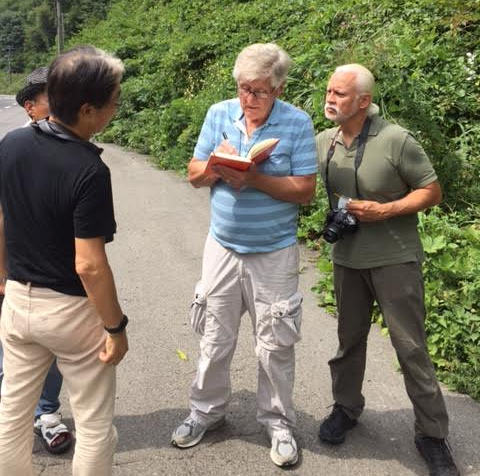Ongoing Radioactivity in Japan
/Updates From Japan
By Maggie Gundersen & Ben Shulman-Reed
Fairewinds in the News:
After Hurricane Irma, which Fairewinds covered in our previous newsletter Hurricane Season and Atomic Power Reactors, Maggie Gundersen was interviewed by Newsweek about the status of Turkey Point atomic power plant once it was revealed that the plant experienced a failure in one of the reactor's cooling systems during the midst of the hurricane. In addition to the fact that the atomic power plant still does not meet post-Fukushima safety regulations according to the Nuclear Energy Institute (NEI), the lobbying arm of the Nuclear industry, there was almost certain threat of loss of offsite power (LOOP), as well as flooding risks to the facility itself.
Read Full Article Here
In this interview, the fifth part of a 15-part mini-series titled, Nuclear Power in Our World Today, Arnie Gundersen speaks from his experience working within the nuclear industry about the inherent safety risks that are built into General Electric’s Mark 1 Boiling Water Reactor (BWR) design. This is the same design as the three atomic reactors that melted down at the Fukushima Dai-ichi site in Japan. The U.S. currently has 23 Mark 1 operating BWRs. By taking a closer look at the politics, lobbying, and deception used by General Electric to promote its design, it becomes more evident that a faulty atomic power reactor design was allowed to be sold and built around the world.
Read Full Article Here
Nuclear Hotseat - Hurricanes and Nukes: A Special Report Post-Irma and Harvey
Maggie Gundersen is interviewed by Nuclear Hotseat host Libbe HaLevy about what actually happens when a Hurricane makes landfall on an area that is host to atomic power reactors. With all the various threats a storm can cause, it becomes crucial to take into account how a natural disaster like Hurricane Irma would worsen if a radiological release occurred at the same time.
In another interview about Hurricane Irma and the threats caused to the Turkey Point nuclear power plant in Florida, Maggie Gundersen assesses the risks involved with keeping the two atomic power plants running in the face of such a monstrous storm, and how the risks to the health and safety of the community greatly outweigh the benefits of keeping any atomic power plant operating during adverse weather events.
Reminder:
We hope you took the opportunity to download Arnie Gundersen and Marco Kaltofen’s peer-reviewed journal article at no cost!
It is still available via the attached link, but if it is for academic or for personal use only – remember no derivatives or publishing.
As you will learn in subsequent months, the STOTEN research is even more pertinent following Arnie and Marco’s trip to Japan.
The environmental journal: Science of the Total Environment (STOTEN) published a groundbreaking peer-reviewed scientific report authored by Arnie Gundersen and Marco Kaltofen.
Since its release, the peer-reviewed journal article by Arnie and Marco has been phenomenally well-received online, and now awaits its physical print release next week. In less than six weeks, Altmetric, a software tool that tracks scientific journal reads has noticed the article’s incredible reach.
Altmetric has tracked 8,157,279 research outputs across all sources so far. Compared to these this one has done particularly well and is in the 97th percentile: it's in the top 5% of all research outputs ever tracked by Altmetric.
About the Paper: Since the meltdown 6-years ago, Fairewinds and Dr. Marco Kaltofen with WPI (Worcester Polytechnic Institute) have conducted detailed analysis on crowd-sourced scientific samples for this cutting edge research. The samples analyzed showed that radioactive hot particles from the Fukushima nuclear meltdowns are still contaminating Japan. Arnie and Marco returned to Japan September 2017 for several weeks to continue their radioactive research and educational work with scientists in Japan who organize and conduct this crowd-sourced scientific sampling effort.
Here is the link to this fundamental study conducted by Arnie and Marco: http://www.fairewinds.org/newsletter-archive//press-release-radioactively-hot-particles-in-japan You may also follow links on this press release to the actual Journal article and to the Fairewinds Energy Education website for all supplemental materials as well as an interactive map.
Fairewinds would not be where we are today without your past support, please help us move into tomorrow and beyond by donating today so that we may continue this vital work. You may donate to our general educational efforts or specifically to the Japan Project. Detailed science like Fairewinds Japan Project needs ongoing funds to continue its research, analysis, and educational programming.
Every bit of Fairewinds’ effort takes money.
We need your support now to continue our scientific research.
Please help us financially,
so that we can collect the data, conduct analyses, and produce the newsletters, videos, and podcasts you depend upon!
Also, be sure to follow Fairewinds on Facebook and Twitter!
Not into social media?
Don't worry, you can get the most up to date energy news by following Fairewinds' live RSS Twitter feed
available on our homepage - www.fairewinds.org!



